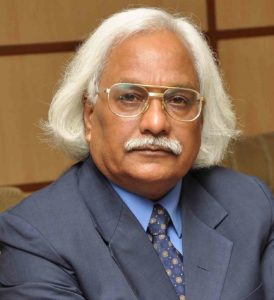Written By Prof PB Sharma, Vice-Chancellor, Amity University Haryana, Gurugram.
The class of 2020, graduating this year were given the mandate at the commencement of their studies in the colleges and the universities the world over to dream big and create a new world of prosperity and bliss by manifesting the abundance of creativity and innovativeness that the young inspired minds possess. Empowered with immense capabilities and creative abilities these young inspired minds were to be the ambassadors of a new dawn of human excellence.

This mandate has a great meaning now for them as they graduate this year, in 2020, in a year that has shaken the whole world by the devasting impact of Corona Virus Pandemic. With factories shut, the business closed and prolonged lockdown curtailing mobility to almost zero for over 2 months has posed before the professionals of the new age, especially to the class of 2020 a monumental challenge to rebuild the national and global economies, and respond with courage, conviction, and firm resolve this greatest challenge of the century. I salute the Class of 2020 who is ordained to shoulder this great responsibility.
The class of 2020 is empowered with the enormous power of technology and possess a great vision to create a world of prosperity and abundance of blissful engagement to turn around the devastated economies and build a world much better than what it was before COVID-19, that was marked with highly degraded health of the environment, great economic divide and development concentrated in megacities based urbanization that created ultra-rich in increasing numbers alongside mega slumps and clusters of urban poverty.
The ever-exciting horizons of high technology such as AI, Machine Learning, Virtual Reality and rapidly moving layers of automation and IoT based connectivity driving almost all aspects of humans endeavors are here to present great opportunities for empowered young India to move use Advantage Technology to accelerate growth and development in a manner that it achieves the UN Sustainable Development Goals such that no one is left behind.
 It was said in the year of commencement that the 21st century is the century of people, a century of mind and century of great opportunities to scale the unscalable and make the impossible possible. I remember my commencement address to the Class of 2020, way back in years of 2016 & 2017 wherein I had echoed similar sentiments and have given great hope to the young inspired minds that joined the university charting a bright future for mankind and an assured career path for themselves. I inspired them to give their very best to the studies they pursue and within the university system created an abundance of opportunities for them to learn and shape themselves as global leaders.
It was said in the year of commencement that the 21st century is the century of people, a century of mind and century of great opportunities to scale the unscalable and make the impossible possible. I remember my commencement address to the Class of 2020, way back in years of 2016 & 2017 wherein I had echoed similar sentiments and have given great hope to the young inspired minds that joined the university charting a bright future for mankind and an assured career path for themselves. I inspired them to give their very best to the studies they pursue and within the university system created an abundance of opportunities for them to learn and shape themselves as global leaders.
But what a great change that has come and that too all of a sudden with Covid-19 pandemic wherein we are now forced to thoroughly review and reboot our developmental plans and strategies to get back to work from the prolonged lockdown.
A new normal is being advocated wherein the world of work would ever be the same again. In this new normal we shall be asked to strive for a perfect balance of working from home as also working in the offices and on the shop floors.
The whole gamete of work activity is being thoroughly reviewed from the point of view of a secure and safe work environment and also through ‘business process re-engineering’ to identify spaces where work from home could be as effective as sitting at the work station in the office earlier.
For ICT and service sector this shall work well to great extent but with a great strain as coordination and effective interaction that forms the core of the IT sector services shall form a new challenge in the new normal post-COVID-19.
For the manufacturing sector, the new normal shall enable the back office management including a whole lot of logistics and support services to operate from remote locations while critical human workforce and the robotic co-workers carrying out the activity on the shop floor in a networked factory environment. We need to devise effective strategies to cope with these pressures of the new normal once the Covid-19 is fully unlocked.
But all this is going to exert tremendous pressure on the manpower needs and the new skill sets that would be required for the highly tech-savvy work environment. The future of the job needs to be seriously reviewed to identify the areas that require immediate attention for industry readiness of the workforce for the new normal post-COVID-19 lockdown.
The other important area that needs the most urgent attention of the policy planners who are devising post-COVID-19 development strategies to concern the fate of millions of workers who have left the megacities like Delhi, Noida, Mumbai, Kolkata, Bangalore, Chennai and Hyderabad and took all the pains to return to their roots, even walked back hundreds of kilometers to their villages.
How to now ensure that they are productively engaged at their villages and in rural areas as they have seen the plight of the megacities, the slumps, the polluted environment, and above all the apathy of their employers towards their wellbeing.
To bring them back to the cities and moving the vehicle of development on the tacks of rapid growth in a business as usual scenario would spell doom for them as well as to the health of the environment. Hence, environmental enforcement agencies should seek incentives and heavy investments in carbon-neutral technologies and implementation of zero- discharge systems. More effective industrial and municipal waste management systems are therefore urgently needed to safeguard the interest of man and environment in the coming days.
Alternatively, a bright future for the millions of workers who have returned to their roots could be created by the government taking the task of creating a whole lot of enterprises and businesses that can be now be moved to rural areas as the road and rail connectivity is much better and the IT infrastructure is also in place in rural areas. This can enable rapid growth of a whole lot of rural industries and enterprises in areas such as Food Processing Technologies, Energy Technologies, Water Technologies, Agri Technologies and the clusters of call centers and BPOs could also be easily developed in the rural areas, thus minimizing the reverse migration to megacities while at the same time creating the fortune at the bottom of the pyramid.
 Addressing the youth of India in a Webinar organized by Amity University a week ago the Nobel Peace Laureate Prof Muhammad Yunus invited the young inspired minds of India to go out to the rural areas and create waves of development.
Addressing the youth of India in a Webinar organized by Amity University a week ago the Nobel Peace Laureate Prof Muhammad Yunus invited the young inspired minds of India to go out to the rural areas and create waves of development.
“This catastrophe is giving you an opportunity to do things in a magnified way. Bring all the creative ideas and thinking you have and do not let this time slip away from you”. This wise counsel from the Nobel Peace Laureate Prof Muhammad Yunus hols a great meaning to the Class of 2020 in that it is an opportunity of the lifetime to make a difference that shall have a landmark impact on the future of mankind.
The Government is well advised to use the data is has generated now form the information furnished by workers at railway stations and also the MSME data for EPF subsidy to effectively plan and the optimal strategy for achieving the goal of inclusive development in India, by developing that part where the bulk of the population of Bharat resides. The new normal of rural-urbanization shall create the desired economic transformation that shall assure growth and development to create the New India of our dream where fair prosperity and happiness will be within the reach of everyone.
About the author:
Prof PB Sharma, Vice-Chancellor Amity University Haryana, Gurugram, is also the Founder Vice-Chancellor DTU and RGTU, and Past President of Association of Indian Universities (AIU).



